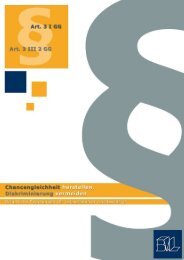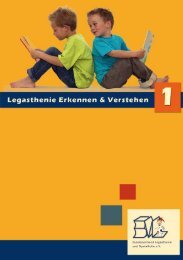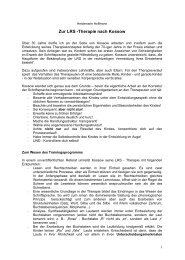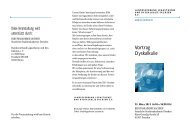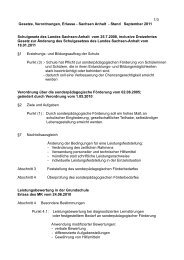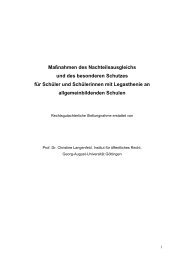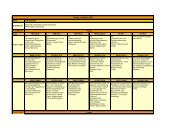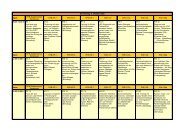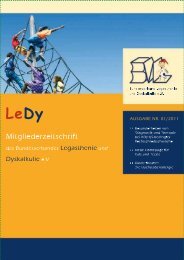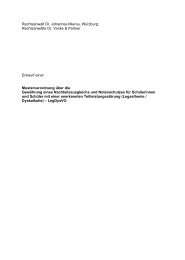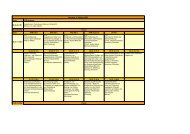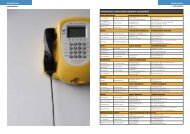Testverfah - Bundesverband Legasthenie und Dyskalkulie eV
Testverfah - Bundesverband Legasthenie und Dyskalkulie eV
Testverfah - Bundesverband Legasthenie und Dyskalkulie eV
Erfolgreiche ePaper selbst erstellen
Machen Sie aus Ihren PDF Publikationen ein blätterbares Flipbook mit unserer einzigartigen Google optimierten e-Paper Software.
15. Kongress des <strong>B<strong>und</strong>esverband</strong>es <strong>Legasthenie</strong> Abstractband<br />
functional MRI (fMRI) studies of reading impairment have demonstrated reduced<br />
functional activity associated with reading in left hemisphere regions such as the<br />
mid-temporal and left fusiform gyrus. Furthermore, adult Diffusion Tensor Imaging<br />
(DTI) studies have demonstrated that reading disability correlates with white matter<br />
integrity within left hemisphere regions, including superior-inferior fibers at the level<br />
of the cingulum (Klingberg, 2000; Beaulieu, 2005). We examine the possibility that<br />
such relationships are present in childhood, during the early school years when<br />
reading disability first emerges in a stable fashion. Results demonstrate significant<br />
correlations between children’s standardized reading scores and Fractional Anisotropy<br />
(FA) scores extracted from two anatomically defined regions of interest near the<br />
left perisylvian cortical regions including the arcuate fasiculus and superior-inferior<br />
white matter tracts at the level of the cingulum. Furthermore, these same subjects<br />
participated in an fMRI study contrasting BOLD responses during a reading task<br />
versus a resting condition. Similar to previous findings in adults, children as a group<br />
demonstrated significant reading-related increases in BOLD responses within left<br />
mid-temporal and left basal-temporal regions, as well as within frontal regions. To<br />
investigate potential relationships between individual differences in white matter<br />
tract development and functional activation during the reading task, we examined<br />
BOLD responses within two regions of interest implicated in the current and previous<br />
reading research: left mid-temporal and left fusiform gyrus, as a function of<br />
individual variation in the DTI scores described above. Results showed significant<br />
correlations between fractional anisotropy scores and BOLD responses, suggesting<br />
a potential link between white matter tract development and functional activation of<br />
reading-related regions in children. Finally, I will review findings that demonstrates<br />
that some patterns of functional activation can be significantly impacted by reading<br />
intervention efforts.<br />
Korrespondenzautor: Bruce McCandliss<br />
bdm2001@med.cornell.edu<br />
++1 212 5465837<br />
++1 212 7465755<br />
From quantitative genetics to behavioural genomics: Early reading abilities and<br />
disabilities<br />
*Emma Meaburn (1), Nicole Harlaar (1), Robert Plomin (1)<br />
(1) King’s College London, Institute of Psychiatry, London, Großbritannien<br />
Identifying specific genes for reading disabilities has been an elusive goal despite<br />
research efforts spanning 22 years. We have used quantitative genetic research<br />
on a large sample of twins to guide our molecular genetic research which uses a<br />
systematic association design that provides power to detect quantitative trait loci<br />
(QTLs) of small effect size. Our quantitative genetic analyses, based on 7500 pairs<br />
of 7-year-old twins in the UK Twins Early Development Study (TEDS), have yielded<br />
three main findings: (1) Early reading disabilities are highly heritable; (2) Genes that<br />
influence reading disability also influence normal-range reading abilities; and (3)<br />
There is large overlap between genetic influences on diverse reading processes and<br />
other cognitive processes.<br />
63



